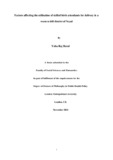Please use this identifier to cite or link to this item:
http://archive.nnl.gov.np:8080/handle/123456789/188| Title: | Factors affecting the utilisation of skilled birth attendants for delivery in a western hill district of Nepal |
| Authors: | Baral, Yuba Raj |
| Keywords: | SKILLED BIRTH ATTENDANTS |
| Issue Date: | 27-Mar-2019 |
| Abstract: | Nearly three hundred thousand maternal deaths occur worldwide every year. More than 99% of deaths occur in developing countries. The use of skilled birth attendants is low in those countries where maternal mortality rates are high and most of these deaths could be prevented if skilled birth attendant services were available. Only 36 percent of women use skilled birth attendants in Nepal. There are many reasons for non-use of skilled birth attendant services, such as inequalities, lack of access to services, role of gender and culture and lack of women’s autonomy in decision-making. The purpose of this study was to explore the views, experiences and perceptions of women influencing utilisation of skilled birth attendants in rural Nepal. Listening to the women’s voices and views were central to this study in order to understand why women use or does not use skilled birth attendants. Women’s individual characteristics, family, community and organisation factors are interconnected in regards to uptake of skilled birth attendants, as well as policy factors. A case-study approach using mixed methods was taken to explore the women’s experiences and perceptions in a hill district of western Nepal. Interviews were conducted with 24 ‘new mothers’ aged 18-49 years and five mothers-in-law, two husbands and a father-in-law. A survey was conducted of 100 qualified skilled birth attendants (doctors, nurses and midwives) to understand service providers view towards women’s use of skilled birth attendant in two hospitals (one private and one public hospital): 56 SBAs responded. The qualitative data were analysed using a thematic analysis approach and descriptive statistics were derived from the quantitative data. The study found that individual characteristic of women, the location and infrastructure of health facilities, cultural and gender factors, including women’s expectations and preferences about skilled care use, affected uptake of skilled birth attendant services. Socio-cultural and political contexts were found to be interconnected in health service utilisation. Socio-economic inequality based on caste and gender, access to qualitative services and women’s lack of autonomy are some of the factors that influence the uptake of care by skilled birth attendants. |
| URI: | http://103.69.125.248:8080/xmlui/handle/123456789/188 |
| Appears in Collections: | 300 Social sciences |
Files in This Item:
| File | Description | Size | Format | |
|---|---|---|---|---|
| YUBA- PhD-2014.pdf | 2.8 MB | Adobe PDF |  View/Open |
Items in DSpace are protected by copyright, with all rights reserved, unless otherwise indicated.